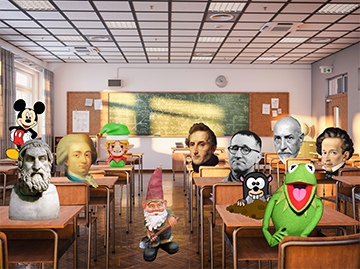Homer’s verses re-read through the eyes of the archaeologist Heinrich Schliemann, famous for having found the remains of the legendary city of Troy, allowing the discovery of the places which were the theatre of the most legendary war in history, and bringing life to the spectres of all the wars that followed.
The Iliad is a poem that speaks of war and exalts the military virtues of its heroes. It is also, however, the narration of all of the people involved in a war - soldiers and civilians, heroes, women and children - the perfect description of an enormous tragedy and the repercussions on the community.
Between the lines of Homer’s beautiful verse lies the pain for the death of a son or a husband, a brother or a friend, the desperate fight to defend ones own city or honour, the fear of destruction and loss. In this sense, the Trojan war represents the matrix of all wars: it is the first that was written about, but it contains them all. Starting with Homer’s Iliad, the play - through the accounts of Heinrich Schliemann, the archaeologist that discovered the ruins of Troy - follows the thread that ties legend, epic and narration to the present. Because, even if times, eras and wars change, the themes that regard mankind are destined to always remain the same.
Duration: 1 hour and 15 minutes with no interval
The Iliad is a poem that speaks of war and exalts the military virtues of its heroes. It is also, however, the narration of all of the people involved in a war - soldiers and civilians, heroes, women and children - the perfect description of an enormous tragedy and the repercussions on the community.
Between the lines of Homer’s beautiful verse lies the pain for the death of a son or a husband, a brother or a friend, the desperate fight to defend ones own city or honour, the fear of destruction and loss. In this sense, the Trojan war represents the matrix of all wars: it is the first that was written about, but it contains them all. Starting with Homer’s Iliad, the play - through the accounts of Heinrich Schliemann, the archaeologist that discovered the ruins of Troy - follows the thread that ties legend, epic and narration to the present. Because, even if times, eras and wars change, the themes that regard mankind are destined to always remain the same.
Duration: 1 hour and 15 minutes with no interval
Meetings and insights
Credits
Piccolo Teatro Strehler
from 9 to 24 January 2017
Iliade, mito e guerra
by Homer
dramaturgy by Giovanna Scardoni
with Nicola Ciaffoni
directed by Stefano Scherini
light designer Anna Merlo
sets by Gregorio Zurla
costumes by Giada Masi
artistic collaboration Linda Faccenda
A Piccolo Teatro di Milano – Teatro d’Europa production
in collaboration with the Associazione Culturale Mitmacher
Information and bookings
Telephone service 02.42.41.48.89
From Monday to Saturday 9.45 a.m. – 6.45 p.m.
Sunday 10.00 a.m. – 5.00 p.m.
Teatro Strehler
From Monday to Saturday 9.45 a.m. to 6.45 p.m.
Sunday 1.00 p.m. to 6.30 p.m.
On the evening of the performance the sale of tickets will close one hour before the performance begins.
Groups and organisations
For information on tickets and subscriptions for groups and organisations, and afternoon performances for schools and educational shows, please contact the Servizio Promozione Pubblico e Proposte Culturali.
Tel.02.72.333.216
e-mail:promozione.pubblico@piccoloteatromilano.it











